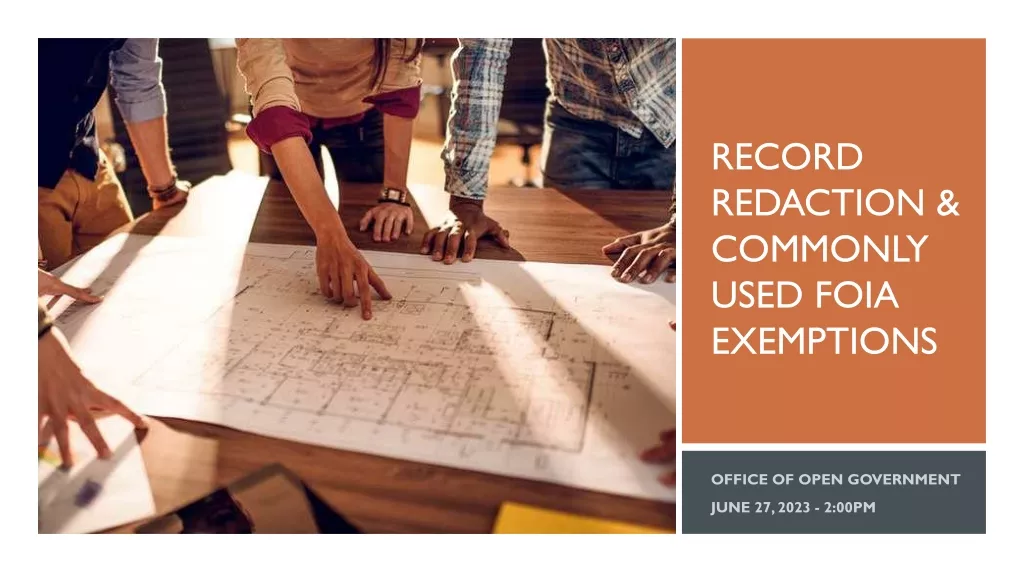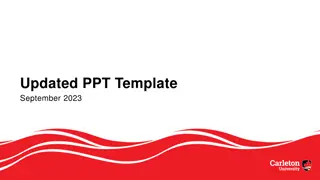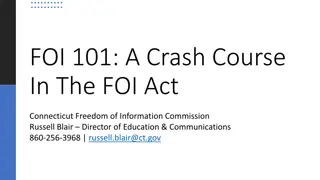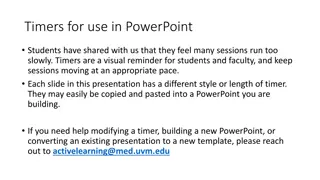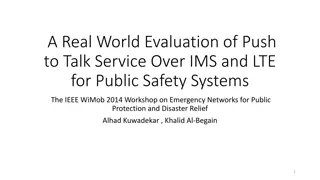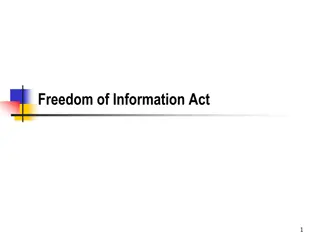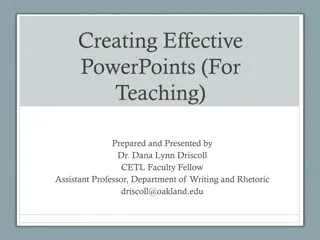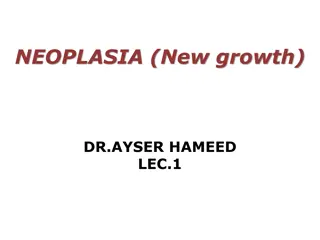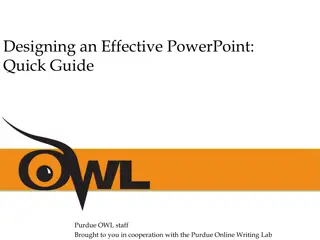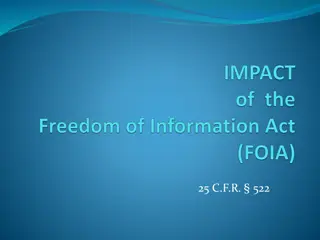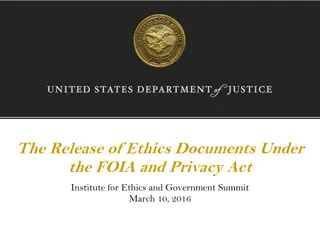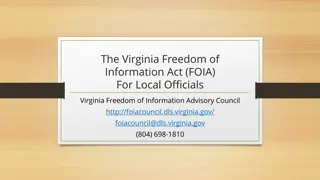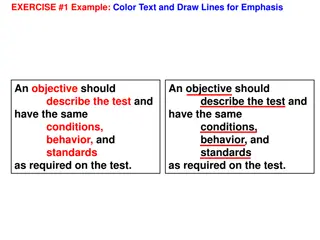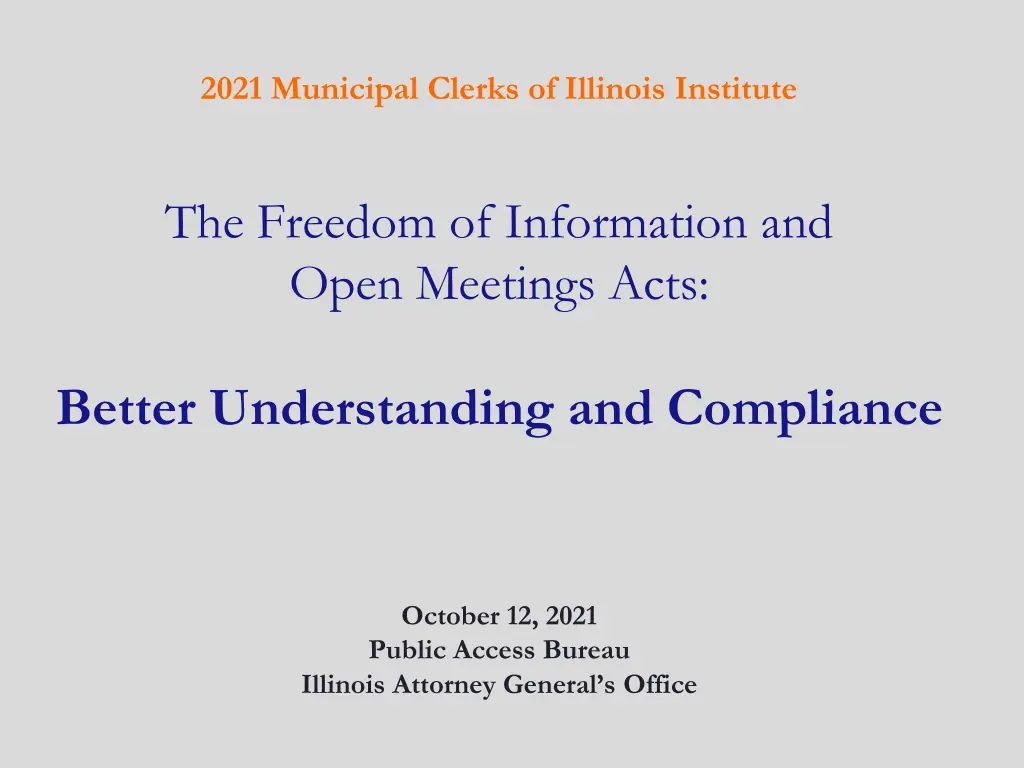
Understanding Illinois Freedom of Information and Open Meetings Acts
Gain a comprehensive understanding of the Illinois Freedom of Information Act (FOIA) and Open Meetings Act (OMA) to ensure compliance and transparency in public bodies. Learn about the Public Access Counselor position, training requirements, and the presumption of openness for public records.
Download Presentation

Please find below an Image/Link to download the presentation.
The content on the website is provided AS IS for your information and personal use only. It may not be sold, licensed, or shared on other websites without obtaining consent from the author. If you encounter any issues during the download, it is possible that the publisher has removed the file from their server.
You are allowed to download the files provided on this website for personal or commercial use, subject to the condition that they are used lawfully. All files are the property of their respective owners.
The content on the website is provided AS IS for your information and personal use only. It may not be sold, licensed, or shared on other websites without obtaining consent from the author.
E N D
Presentation Transcript
2021 Municipal Clerks of Illinois Institute The Freedom of Information and Open Meetings Acts: Better Understanding and Compliance October 12, 2021 Public Access Bureau Illinois Attorney General s Office
Public Access Counselor Position within the Attorney General s Office Created by amendments to FOIA effective January 1, 2010. To provide advice and education with respect to FOIA and OMA; To resolve complaints concerning compliance with FOIA and OMA without litigation. 15 ILCS 205(7)
FOIA/OMA Training Requirement FOIA Training: Yearly, for FOIA Officers OMA Training: One time, for each elected or appointed member of a public body OMA Training: Yearly, for OMA Designee Must file a copy of the certificate of completion with the public body!
Alternative OMA Training Conducted by Specified Organizations Certain Content Must Be Included Certificate Required School Board Members Drainage District Commissioners Directors of Soil and Water Conservation Districts Park, Forest Preserve, Conservation, and Fire Protection District Members Municipality Members See 5 ILCS 120/1.05 (c)-(g)
Freedom of Information Act (5 ILCS 140/1 et seq.)
The Purpose of FOIA The General Assembly hereby declares that it is the public policy of the State of Illinois that access by all persons to public records promotes the transparency and accountability of public bodies at all levels of government. It is a fundamental obligation of government to operate openly and provide public records as expediently and efficiently as possible in compliance with this Act. (Emphasis added.) 5 ILCS 140/1
Presumption of Openness public records are open to inspection or copying: Under FOIA, there is a presumption that all Presumption. All records in the custody or possession of a public body are presumed to be open to inspection or copying. Any public body that asserts that a record is exempt from disclosure has the burden of proving by clear and convincing evidencethat it is exempt. 5 ILCS 140/1.2 (added by 2010 amendments)
Definition of Public Records The definition of public records includes: [A]ll * * * documentary materials pertaining to the transaction of public business, regardless of physical form or characteristics, having been prepared by or for, or having been or being used by, received by, in the possession of, possessed or under the controlof any public body. 5 ILCS 140/2(c)
What is a Public Record? Emails and Texts Electronic correspondence is subject to FOIA if it pertains to the transaction of public business. Even if sent on personal devices (texts on cell phones paid for by employee) or to/from personal email accounts.
Emails and Texts Pertaining to Public Business are Subject to FOIA City of Champaign v. Madigan, 2013 IL App (4th) 120662 (2013): Elected official s communications sent or received on a personal electronic device during a public meeting Ill. Att'y Gen. Pub. Acc. Op. No. 16-006 (August 9, 2016) (aff d by Circuit Court of Cook County): Public employees emails sent or received via personal accounts City of San Jose v. Superior Court of Santa Clara County, 2017 WL 818506 (Cal. 2017): City employee s emails sent or received using a personal account
Emails and Texts Pertaining to Public Business are Subject to FOIA With respect to locating emails or texts on personal devices or emails in personal accounts, the public body may be able to fulfill its obligations under FOIA by asking personnel to search their e-mail accounts in good faith. Ill. Att'y Gen. Pub. Acc. Op. No. 16-006, issued August 9, 2016.
Explanations and Questions FOIA is not intended to compel public bodies to interpret or advise requesters as to the meaning or significance of the public records. 5 ILCS 140/3.3 A public body is not required to answer questions or generate new records in response to a FOIA request. Kenyon v. Garrels, 184 Ill. App. 3d 28 (4th Dist. 1989)
Need Not Create Public Records FOIA does not require a public body to create records in order to respond to a FOIA request; rather a public body is required to make records within its possession or control available for inspection and copying. Workmann v. Illinois State Bd. of Educ., 229 Ill. App. 3d 459, 464 (2d Dist. 1992).
Compiling Information Is Not Creating New Records create entirely new records consisting of information that is not in its possession or custody, but a public body may be required to compile and re-organize information that it already maintains in the ordinary course of business. Hamer v. Lentz, 132 Ill. 2d 49, 57 (1989). Hites v. Waubonsee Community College, 2016 IL App (2d) 150836 (2016). FOIA does not require public bodies to
Designated Public Records Records documenting public funds spent or received: section 2.5 Arrest reports: section 2.15: Arrestee name, age, address, and photograph if available; information detailing any charges relating to the arrest Certified payrolls (pursuant to Prevailing Wage Act): section 2.10 Settlement and severance agreements: section 2.20 Some redactions allowed
Record Held by Agent A public record that is not in the possession of a public body but is in the possession of a party with whom the agency has contracted to perform a governmental function on behalf of the public body, and that directly relates to the governmental function and is not otherwise exempt under this Act, shall be considered a public record of the public body, for purposes of this Act. 5 ILCS 140/7(2) Better Government Ass'n v. Illinois High School Ass'n, 2017 IL 121124 (2017)
Record Held by Agent Examples of public records in the possession of contractors: External auditor s work papers and notes. Ill. Att y Gen. PAC Req. Rev. Ltr. 57836, issued September 10, 2019. Engineering firm s records related to the design of a public sidewalk and curb improvement project. Ill. Att'y Gen. Pub. Acc. Op. No. 13-018, issued December 3, 2013. Sewer repair contractor s certified payroll records.Ill. Att y Gen. PAC Req. Rev. Ltr. 50115, issued November 16, 2017. Attorney s records directly relating to the defense of the public body.Ill. Att y Gen. PAC Req. Rev. Ltr. 43089, issued October 6, 2017. Emergency transport contractor s records regarding response and transport times. Ill. Att y Gen. PAC Req. Rev. Ltr. 45910, issued August 29, 2017.
FOIA Requests In writing, directed to the public body. Oral requests may be honored. Standard form may not be required. Public body may not require requester to specify a purpose, except to determine whether the request is for a commercial purpose. Forward immediately to FOIA officer. 5 ILCS 140/3(c)
Time for Responding 5 business days after receipt of a request (non-commercial). Public body may extend response time for an additional 5 business days for one of seven reasons specified in the Act. 5 ILCS 140/3(d),(e)
Failure to Respond time permitted is considered a denial of the request. A public body that fails to respond to a request within the time permitted, but then provides copies of the requested public records may not impose a feefor those copies. A public body that fails to respond to a request received may not treat the request as unduly burdensome under section 3(g). 5 ILCS 140/3(d) Failure to respond to a request within the
FOIA Response granted in part and denied in part. If denying a request for public records the public body shall notify the requester in writing of: A FOIA request may be granted, denied, or 1. The decision to deny the request, 2. The reasons for the denial, including a detailed factual basis for the application of any exemption claimed, and 3. The names and titles or positions of each person responsible for the denial.
FOIA Response, cont. In addition, each notice of denial by a public body shall: 1. Inform the requester of his or her right to seek review by the Public Access Counselor, 2. Provide the address and phone number of the Public Access Counselor, 3. Inform the requester of his right to judicial review under section 11 of FOIA. 5 ILCS 140/9(a)
Requests for Electronic Copies A public body must produce records that are maintained in an electronic format in the electronic format specified by the requester, if feasible. If not feasible, must disclose in the electronic format in which the records are maintained or in paper, at the option of the requester.
Records Maintained Online record that is published on the public body's website. Public body must notify the requester that the public record is available online and direct the requester to the website. Persons unable to reasonably access the record online may re-submit the request, public body must then respond as provided in section 3. 5 ILCS 140/8.5 A public body is not required to copy a public
Unduly Burdensome Requests Section 3(g) permits a public body to deny a request if the burden of compliance on public body outweighs public interest in the information. Before invoking this section, public bodies must extend to requester an opportunity to confer with it to reduce the request to manageable proportions. Repeated requests by same person for same records identical to records previously provided or properly denied are unduly burdensome. 5 ILCS 140/3(g)
Unduly Burdensome - Examples manually locating and compiling large numbers of records from 93 separate facilities or systems over a 23-year time span. compiling all records, including financial records, school policies, and correspondence for a 12-year period. only two employees to gather, review, and redact thousands of records from several sources over a six-year span.
EXEMPTIONS To enable public bodies to maintain certain types of sensitive public records confidentially, FOIA provides a number of exceptions to the requirement that public records be made available for public inspection. The exemptions do not, however, prohibit the dissemination of information; rather, they merely authorize the withholding of information. Roehrborn v. Lambert, 277 Ill. App. 3d 181, 186 (1st Dist. 1995), appeal denied, 166 Ill. 2d 554.
Exemptions are Narrowly Construed The exemptions to disclosure under FOIA are to be narrowly construed. Lieber v. Board of Trustees of Southern Illinois University, 176 Ill. 2d 401, 408 (1997).
FOIA Section 7(1) When a record contains information that is exempt under section 7 or 7.5, but also contains information that is not exempt, the public body may elect to redact exempt information; remaining information shall be made available for inspection and copying. 5 ILCS 140/7(1) See, e.g., Ill. Att y Gen. PAC Rev. Ltr. 37563, issued October 20, 2016 (public body must redact exempt portions of video recordings and furnish non-exempt portions).
Section 7(1)(a) Exempts from disclosure: Information specifically prohibited from disclosure by federal or State law or rules and regulations implementing federal or State law. 5 ILCS 140/7(1)(a) Note: 7(1)(a) does NOT include municipal ordinances. City of Chicago v. Janssen Pharmaceuticals, Inc., 2017 IL App (1st) 150870, 24, 78 N.E.3d 446, 462 (2017).
Section 7(1)(a) Information Exempt Under Other Laws Examples: Open Meetings Act (5 ILCS 120/2.06(f)) Election Code (10 ILCS 5/4-8; 10 ILCS 5/5-7) Workers Compensation Act (820 ILCS 305/6(b))
7(1)(b) PrivateInformation Allows withholding of private information, unless required by another provision of FOIA, a State or federal law or a court order. Private information is defined in section 2(c-5) of FOIA.
7(1)(b) PrivateInformation 5 ILCS 140/2(c-5) Unique identifiers, including: Social Security, Driver s License, and Employee Identification numbers Home or Personal Telephone Numbers Personal Email Addresses Biometric Identifiers (DNA, retina/iris scan, fingerprint, voiceprint, scan of hand) Personal Financial Information Passwords or Other Access Codes Medical Records
Private Information 5 ILCS 140/2(c-5) Unique identifiers, including: Home addresses Personal license plates Except when compiled without possibility of attribution to any person Other Unique identifiers Zip codes (when coupled with identifying information like name) Signatures
7(1)(c) Personal Information Exempts [p]ersonal information contained within public records, the disclosure of which would constitute a clearly unwarranted invasion of personal privacy, unless the disclosure is consented to in writing by the individual subjects of the information[.] 5 ILCS 140/7(1)(c)
7(1)(c) Personal Information bears on the public duties of public employees and officials shall not be considered an invasion of personal privacy. 5 ILCS 140/7(1)(c) The disclosure of information that
Exempt Personal Information Dates of birth Race Information related to unsuccessful candidates for employment Specific medical information (i.e. explanations for sick leave, descriptions of specific injuries) Victim names/identifying information Names of suspects not arrested, third parties mentioned incidentally in reports Graphic photos, descriptions of offenses/autopsies
7(1)(d) Law Enforcement Exemptions 7(1)(d)(i): pending law enforcement proceedings 7(1)(d)(ii): interference with active administrative enforcement proceedings 7(1)(d)(iii): deprivation of fair trial/hearing 7(1)(d)(iv): protection of witnesses, confidential sources 7(1)(d)(v): special investigative techniques 7(1)(d)(vi): danger to life or physical safety 7(1)(d)(vii): obstruction of ongoing criminal investigation
7(1)(f) Deliberative Process Allows withholding of records in which opinions are expressed, or policies or actions are formulated Except when record is publicly cited by head of public body The purpose of the deliberative process exemption is to protect the predecisional communications process and encourage frank and open discussion among agency employees.
7(1)(l) Closed Session Minutes Minutes of meetings of public bodies closed to the public as provided in the Open Meetings Act until the public body makes the minutes available to the public under Section 2.06 of the Open Meetings Act. 5 ILCS 120/2.06(d) of OMA: Each public body shall periodically, but no less than semi-annually, meet to review minutes of all closed meetings. At such meetings a determination shall be made, and reported in an open session that (1) the need for confidentiality still exists as to all or part of those minutes or (2) that the minutes or portions thereof no longer require confidential treatment and are available for public inspection.
7(1)(m) Privileged Information Communications between a public body and an attorney or auditor representing the public body that would not be subject to discovery in litigation, or are prepared in anticipation of litigation. Requests for and provision of legal advice
7(1)(m) Privileged Information Not all attorney/client communications are privileged: Invoices for legal services not exempt. Ill. Att y Gen. Pub. Acc. Op. No. 14-002. issued April 15, 2014. Lists containing names and pay rate of outside counsel for State agencies not exempt. Ill. Att y Gen. Pub. Acc. Op. No. 15-010, issued October 21, 2015.
7(1)(kk) The public body's credit card numbers, debit card numbers, bank account numbers, Federal Employer Identification Number, security code numbers, passwords, and similar account information, the disclosure of which could result in identity theft or impression or defrauding of a governmental entity or a person.
Special Types of Requesters and Requests Commercial (5 ILCS 140/2(c-10) Recurrent (5 ILCS 140/2(g)) Voluminous (5 ILCS 140/2(h))
Open Meetings Act 5 ILCS 120/1 et seq.
OMA Public Policy public policy of this State that its citizens shall be given advance notice of and the right to attend all meetings at which any business of a public body is discussed or acted upon in any way. The General Assembly * * * declares it to be the [T]he people have a right to be informed as to the conduct of their business. 5 ILCS 120/1
What is a Public Body? See Section 1.02 Municipalities State Boards and Commissions Counties All subsidiary bodies of the foregoing bodies School Districts
What Is Not Covered? General Assembly and its Committees or Commissions, also Condominium Associations Individual Officers Private Companies and Their Boards Not-For-Profit Organizations
Openness Required All meetings of public bodies shall be open to the public unless: excepted in subsection (c) and closed in accordance with Section 2a. 5 ILCS 120/2(a)
The Meeting OMA defines a meeting as [a]ny gathering of a majority of a quorum for the purpose of discussing public business. 5 ILCS 120/1.02 Requirements of OMA apply.

